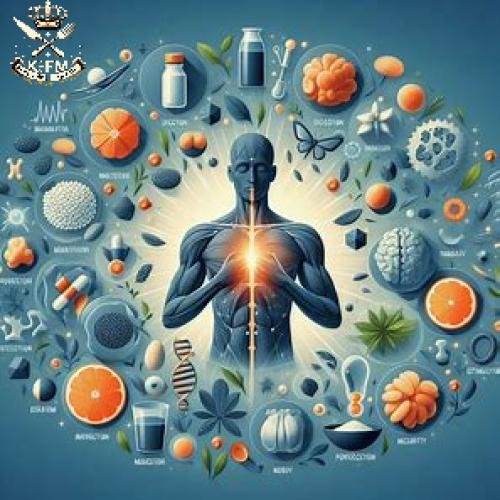The Importance of Iodine for the Human Body
- Thyroid Function:
Iodine is an essential mineral for thyroid function, playing a vital role in the production of thyroxine (T4), a hormone responsible for regulating numerous vital processes in the body. The total iodine content in the human body is estimated at about 12.5 milligrams, with nearly half of this amount stored in the thyroid gland. - Brain Growth and Development:
Iodine is crucial for brain growth and development, particularly during early childhood. It plays a key role in the production of myelin, a fatty substance that coats and protects nerves, thereby enhancing cognitive functions, learning, and memory. - Cardiovascular Health:
Evidence suggests that iodine may help lower blood pressure and reduce the risk of cardiovascular diseases. This is linked to its impact on thyroid function, which influences heart rate and blood pressure regulation. - Immune Support:
Iodine is part of the body’s natural defense system, aiding in strengthening the immune system and protecting against infections. - Bone Health:
Iodine contributes to maintaining healthy and strong bones by regulating the absorption of calcium and phosphorus, which are essential for bone formation. - Cancer Prevention:
Some studies suggest that iodine may play a role in reducing the risk of certain types of cancer, such as breast and ovarian cancer. - Mood and Mental Health:
Research indicates that iodine deficiency may be associated with depression and other mood disorders.
Recommended Iodine Intake:
- Infants (0 to 6 months): 110 micrograms per day.
- Children (7 to 12 months): 130 micrograms per day.
- Children (1 to 8 years): 90 micrograms per day.
- Adolescents (9 to 13 years): 120 micrograms per day.
- Adults: 150 micrograms per day.
- Pregnant and breastfeeding women: 220 micrograms per day.
- Women over 14 years old: 150 micrograms per day.

Symptoms of Iodine Deficiency:
Inadequate iodine intake can lead to various deficiency symptoms, including:
- Goiter:
Enlargement of the thyroid gland, leading to various health complications. - Delayed Mental and Physical Growth in Children:
Severe iodine deficiency can result in mental retardation, stunted growth, or certain congenital abnormalities at birth. - Dry Skin and Slow Heart Rate in Adults:
Symptoms include dry skin, reduced activity levels, weight gain, and feelings of lethargy and fatigue. - Pregnancy-Related Health Issues:
Iodine deficiency during pregnancy may result in a child being born with intellectual or physical disabilities. - Iodized Salt: It is considered one of the most important sources that help ensure individuals get the appropriate amount of iodine.
- Iodized Milk: Some dairy products contain added amounts of iodine.
- Iodized Grains: Some types of whole grains, such as oatmeal or breakfast cereals, may contain iodine.
- Iodized Bread: Some bread manufacturers add iodine to help individuals meet their daily required intake.

Frequently Asked Questions:
Does iodine deficiency lead to depression? Yes, iodine deficiency may be linked to depression and psychological disorders. Some studies have shown that individuals with severe iodine deficiency may experience mood and concentration problems, and in some cases, it can develop into depression.
Does iodine interact with medications? Yes, some medications used to treat thyroid problems may affect iodine absorption in the body. It is essential to monitor iodine levels in the body when taking these medications.
How can iodine absorption be improved? To improve iodine absorption, it is recommended to consume foods rich in vitamin C and omega-3 fatty acids such as fish, flaxseeds, nuts, and leafy vegetables. It is also advised to eat fresh foods and avoid storing food for long periods.
Is iodine found in plant-based foods? Yes, although the main sources of iodine come from marine products, some plant-based foods like vegetables grown near coastlines or watered with salty water contain iodine. Plants like Swiss chard, lettuce, and parsley also contain small amounts of iodine.
What are the risks of excessive iodine intake? Excessive iodine intake can lead to iodine poisoning, which may cause symptoms like skin rashes, nervous system disorders, and increased cholesterol levels in the blood. It may also affect thyroid function, leading to conditions like hyperthyroidism or hypothyroidism.
Conclusion:
Iodine is a vital element for human health, but maintaining an appropriate balance in its intake is crucial. To benefit from iodine without risking overconsumption, it is recommended to follow a varied and balanced diet rich in iodine sources. We pray for health and well-being for all.





















